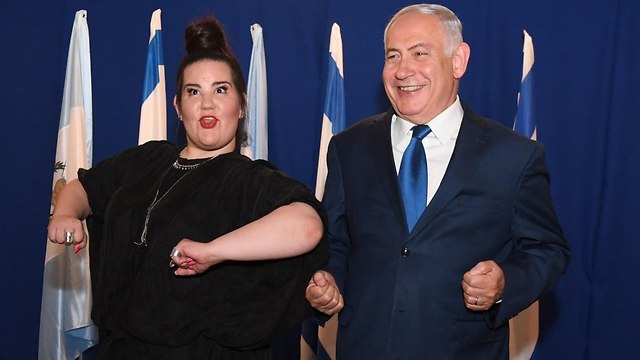
Prime Minister Benjamin Netanyahu announced Tuesday that he renounces his demand to split the Israeli Public Broadcasting Corporation (IPBC, which operated under the name Kan) from its news division, on which he had insisted a year ago, almost leading to early elections.
The decision was made following a meeting on the matter attended by Netanyahu, Communications Minister Ayoob Kara, Culture and Sports Minister Miri Regev, Tourism Minister Yariv Levin, Attorney General Avichai Mandelblit and relevant legal officials.
Mandelblit argued that the law to split the IPBC—which has already passed a Knesset vote in Last May, but is being looked into by the High Court following a petition filed against it—might prevent the Eurovision Song Contest from being held In Israel despite Netta Barzilai winning the 2018 contest.
Therefore, it was agreed to amend the law to split the IPBC in order to allow having the 2019 Eurovision Song Contest in Israel.
The IPBC issued a statement saying, "We will continue carrying out our public mission according to the law, with a strong and independent news division in addition to quality and diverse digital, radio, and television contents which range across the entire spectrum of fields and sectors of the Israeli society."
IPBC's attorney Dori Klagsbald, who filed the petition to the High Court of Justice (HCJ) against the split, said: "Petitioning to the (HCJ) and obtaining an interim order prevented the unconstitutional split.
"I'm certain that annulling the split is the desired and legal outcome of our actions," the attorney opined.
According to the European Broadcasting Union (EBU), splitting the IPBC contradicts its rules concerning the Eurovision Song Contest.
After being instructed by Netanyahu, Mandelblit approached the EBU and requested a clear answer in writing whether Israel would be banned from hosting the Eurovision in case of an IPBC split.
The EBU replied last week that the matter of splitting the IPBC is unprecedented and in case of a split, Israel would have to request again the union's authorization to host the Eurovision.
In case the EBU decides not to allow Israel to host the 2019 Eurovision in Israel, it would lose millions invested in advance in preparations for the contest.
The Eurovision's production has turned to Jerusalem, Tel Aviv, Haifa, and Eilat's municipalities regarding the possibility of them hosting the contest, Ynet learned on Sunday.
The Tamar Regional Council also expressed its desire to host the contest and offered Masada as a possible location to have the event.
The IPBC has to notify the EBU by the end of September about its final decision which city is the most appropriate to host the Eurovision. The final decision on the contest's location, however, will be made by the EBU.

















